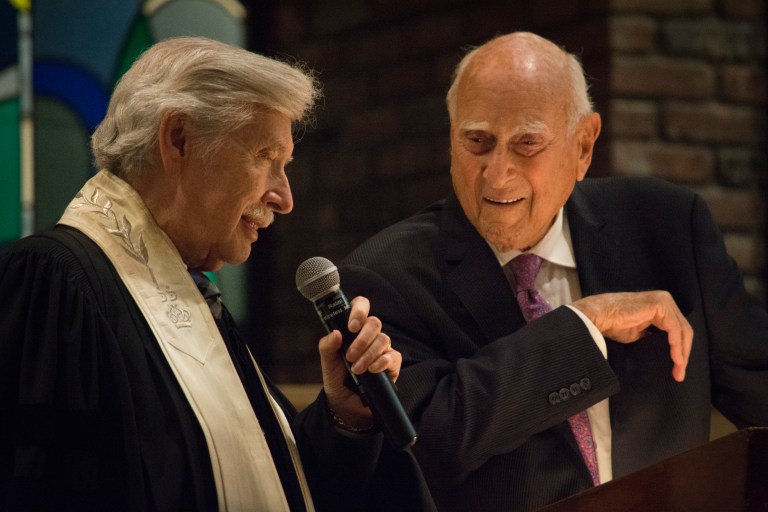
Judge Jack Weinstein, a U.S. federal judge in the Eastern District of New York for 50 years, returned to Temple Emanuel on Friday, outlining the history of civil rights in the country and where they are heading.
Weinstein said that the country is currently in struggle for its “heart and soul.”
He noted a litany of issues the nation faces: the rich having too much power, rising discrimination, a free press under attack, voting restrictions, the eroding power of the Fourth Amendment and women’s rights to abortion and contraception being restricted.
“Since World War II – and today – this country has become, and remains, the world’s greatest protector of opportunity for immigrants and diverse individuals and groups,” Weinstein said. “But, now, civil rights are again under attack.”
Weinstein’s remarks drew upon his time as a judge, lawyer, and judicial scholar, as well as a boy growing up in Wichita, Kan.
Weinstein worked with Justice Thurgood Marshall, signing the brief in Brown v. Board of Education, which legally ended segregation. He also served as County Attorney of Nassau County in the 1960s, writing briefs and arguing against gerrymandering.
“Much of my judicial work has been enforcing anti-discrimination statutes designed to integrate as many people as possible into the country’s economy and life on as equal a basis as is practicable,” Weinstein said.
He said the nation does not have a perfect record, but that it has followed an overall upward trend of expanding civil rights.
When the Bill of Rights was ratified, slavery was still protected and only a few property owning white men could vote, Weinstein noted.
Weinstein also said that in the 1920s, when he was a boy in Wichita, Indians had been cheated out of their land, Jim Crow was the law of the South, the government fought unions and free speech was restricted.
Meanwhile lynching was widespread, Congress passed anti-Jewish immigration laws and the Attorney General authorized illegal search and seizures, Weinstein added.
But each time, the country responded, Weinstead said. The 13th, 14th and 15th amendments sought to eradicate slavery and legislation in the 1960s reinforced them.
The 19th amendment, ratified in 1920, gave women suffrage, the poll tax was abolished in 1964 and 18-year-olds gained the right to vote in 1971.
Ultimately, Weinstein said that he hopes people would come out of his talk thinking about the country’s problems and how to address them – as most Americans have in the past.
“It’s always relevant,” Weinstein said in an interview. “Every generation has its own problems.”







I need you to hear an assault case.